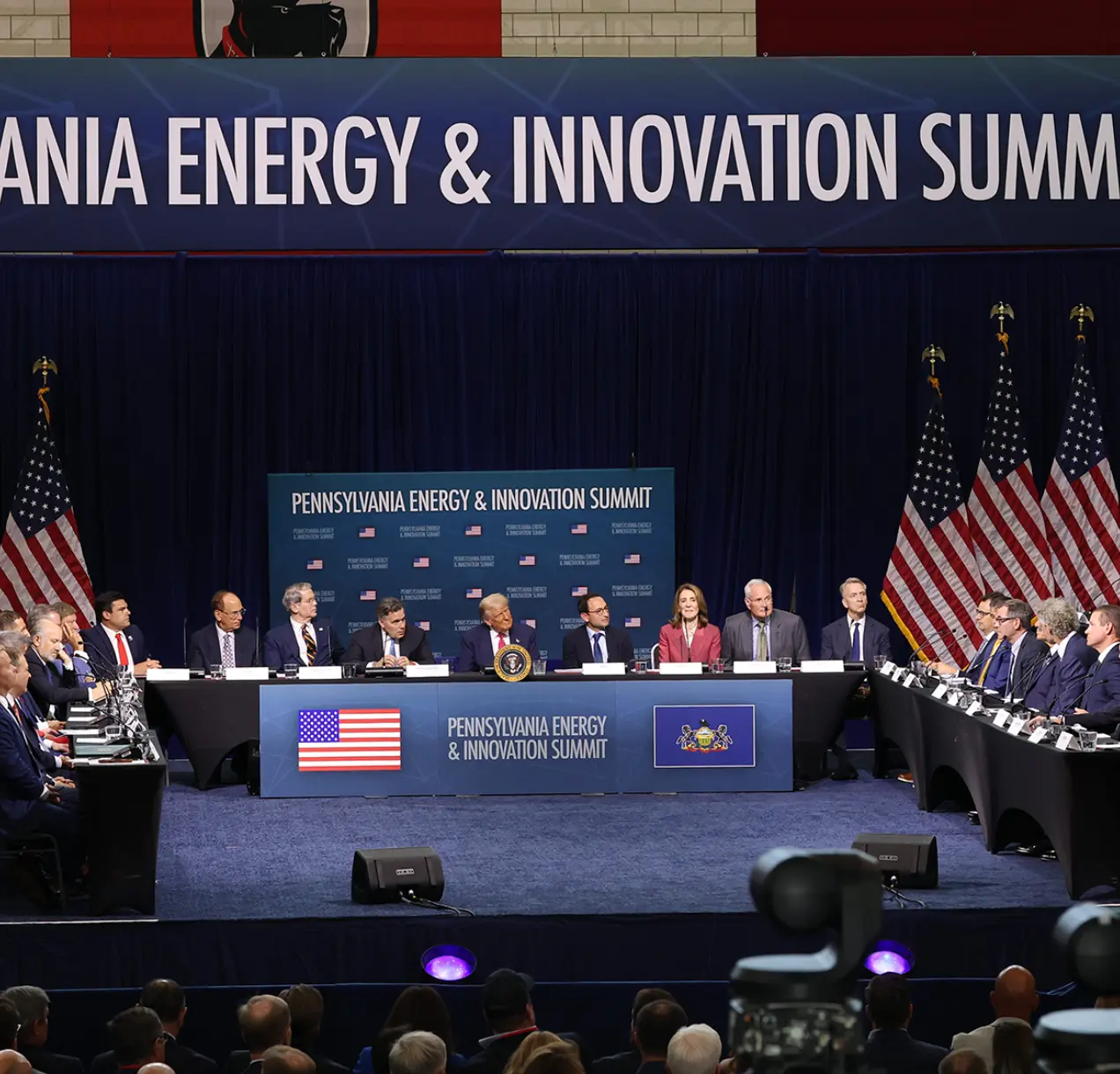The Pennsylvania Energy and Innovation Summit: Powering the Future at Carnegie Mellon University
The summit may have ended, but its impact is only beginning to unfold.

On 15 July 2025, Carnegie Mellon University (CMU) in Pittsburgh, Pennsylvania, hosted the inaugural Pennsylvania Energy and Innovation Summit, a landmark event convened by U.S. Senator Dave McCormick. This gathering brought together a constellation of global leaders from government, industry, academia, and labour to discuss the intersection of artificial intelligence (AI) and energy, a nexus poised to shape the future of technology, economic growth, and environmental sustainability. With high-profile attendees, including U.S. President Donald J. Trump, Pennsylvania Governor Josh Shapiro, and executives from tech giants like Google, Amazon, and BlackRock, the summit underscored Pittsburgh’s, and Pennsylvania’s, potential to lead a new era of innovation. This blog explores the summit’s key themes, announcements, and its broader implications, while also addressing the criticisms and challenges that surfaced during this historic event.
A Confluence of Vision and Opportunity
The Pennsylvania Energy and Innovation Summit at Carnegie Mellon University (CMU) was not only a pivotal event in terms of policy and investment, but also a clear reflection of how AI and energy are becoming increasingly interdependent. This convergence is shaping a new era where cutting-edge digital infrastructure must be supported by equally advanced energy systems. Held in Pittsburgh, a city known for reinventing itself through innovation, the summit underscored how states like Pennsylvania are positioning themselves as critical players in the global AI economy.
Throughout the two-day summit, a strong emphasis was placed on infrastructure readiness, especially the critical role of modernised power grids in supporting AI-driven technologies. Panel discussions explored how AI data centres, with their massive computing requirements, are rapidly becoming some of the largest consumers of electricity in the United States. Experts from Microsoft and Constellation Energy spoke candidly about the energy efficiency challenges ahead, particularly the need for grid resilience, renewable integration, and next-generation nuclear energy options.
One of the more compelling aspects of the summit was the synergy between academic research and private enterprise. CMU faculty showcased ongoing projects, including AI models optimising energy storage, and machine learning algorithms predicting real-time grid stress. Industry leaders highlighted how such research is already shaping investment decisions. Microsoft, for instance, discussed its recent pilot programme involving AI-augmented power monitoring systems to prevent outages in data centre clusters. Meanwhile, Google announced plans to partner with local universities to develop a new AI and Sustainability Lab in the state.
The event also demonstrated how AI’s growth isn’t just a matter of coding and compute, it’s about jobs, cities, and communities. Several speakers addressed workforce development, with President Trump referencing initiatives aimed at training over 100,000 workers in AI-related fields through community colleges and trade programmes. Google and Meta pledged to invest in regional upskilling, ensuring the new economy is accessible beyond Silicon Valley. Blackstone detailed plans to support infrastructure projects in rural areas of Pennsylvania, spreading the economic impact beyond urban hubs.
Perhaps most notable was the unusual level of bipartisan cooperation. While political differences remain sharp across the country, this summit served as a rare example of alignment between federal, state, academic, and corporate stakeholders. Governor Josh Shapiro praised the summit for “bridging ideological divides to pursue pragmatic, future-oriented goals,” while Senator Fetterman called it a “blueprint for how we bring jobs, innovation, and sustainability together.”
Ultimately, the Pennsylvania Energy and Innovation Summit wasn’t just about announcements, it was a turning point. By combining AI innovation, energy modernisation, and workforce planning, it offered a holistic vision of how the U.S. can lead responsibly in the age of artificial intelligence.
The AI-Energy Nexus: Why It Matters
The rapid rise of AI has brought unprecedented opportunities, and challenges. AI technologies, particularly large-scale models powering generative AI and machine learning, require vast computational resources, which in turn demand enormous amounts of energy. Data centres, the backbone of AI infrastructure, are projected to consume a significant portion of global electricity in the coming years. In the U.S., regions like Pennsylvania, with its abundant natural gas reserves and nuclear energy capabilities, are uniquely positioned to meet this demand.
CMU researchers have been at the forefront of studying this AI-energy nexus. Faculty members such as Zico Kolter, director of CMU’s Machine Learning Department, highlighted the region’s potential to lead in this space. “Western Pennsylvania is a hub for this kind of work,” Kolter noted, pointing to the region’s combination of energy resources, skilled labour, and academic excellence. CMU’s work includes forecasting AI data centre energy demands, developing strategies to reduce consumption, and exploring sustainable infrastructure solutions.
The summit’s discussions underscored the urgency of addressing these challenges. Panels such as “The AI Race and How to Win It” explored the global competition for AI dominance, with speakers like Jahanian stressing the importance of talent development. “The truth is that we cannot win the AI race without winning the race for talent,” he said, noting CMU’s decades-long leadership in AI education and research. Other panels tackled energy infrastructure, workforce development, and the economic opportunities for Pennsylvania, a state historically tied to energy production through coal, natural gas, and nuclear power.
Major Announcements: A $90 Billion Investment Boom
The summit’s headline announcement was the $90 billion-plus investment package, which President Trump described as a “triumphant day for the people of the Commonwealth”. These investments, pledged by over 20 leading technology and energy companies, aim to transform Pennsylvania into a global hub for AI and energy innovation. Key commitments included:
1. Google’s $28 billion pledge: Google announced a $25 billion investment in data centre infrastructure across the PJM region (which includes Pennsylvania) and a $3 billion commitment to modernise two hydropower facilities in the state. Ruth Porat, Google’s President and Chief Investment Officer, emphasised the company’s long-standing ties to Pittsburgh, where it established its first office in 2006 on CMU’s campus.
2. Blackstone’s $25 billion investment: The financial giant committed to funding data centres and natural gas-fired power plants in Northeast Pennsylvania, signaling confidence in the region’s energy infrastructure.
3. CoreWeave’s $6 billion data centre: This AI-focused company pledged to build a 300 MW AI data centre in South Central Pennsylvania, further expanding the state’s AI infrastructure.
4. Constellation Energy’s nuclear projects: Constellation announced billions of dollars in investments to accelerate the restart of the Crane Clean Energy Center, expected to return to service in 2027, a year ahead of schedule.
5. Knighthead’s $15 billion power plant: A former coal-fired facility, the Homer City Generating Station, will be transformed into North America’s largest natural gas-fired power plant, revitalising a site that had been decommissioned.
In addition to job creation, the summit placed a strong focus on equity and inclusion in the AI-driven economy. Several speakers noted the risk of a widening digital divide if emerging technologies fail to include rural communities, underrepresented groups, and smaller businesses. To address this, initiatives such as Google’s “AI Works for America” aim to democratise access to AI tools and training. By offering free, localised training sessions, the programme is designed to equip small business owners, entrepreneurs, and workers with practical AI skills—empowering them to boost productivity and compete in an increasingly automated economy.
Another standout announcement came from Anthropic, which committed $1 million to support cybersecurity education in Pennsylvania. The funds will go toward curriculum development at CMU and outreach to public schools, ensuring the next generation is equipped to navigate the complex digital risks that come with AI expansion. This investment is timely, given the growing concerns over data security, algorithmic bias, and the ethical use of artificial intelligence.
Moreover, the summit underscored the need for cross-sector collaboration. Universities, tech firms, government agencies, and energy companies pledged to work together, not only to build infrastructure, but to shape a sustainable, inclusive and resilient future powered by responsible AI innovation.
Pittsburgh’s Unique Position
Pittsburgh’s selection as the summit’s host city was no accident. The city has long been a hub for innovation, with CMU serving as a pioneer in AI research since the 1950s, when founders Herbert Simon and Allen Newell laid the groundwork for the field. Today, CMU’s School of Computer Science, Wilton E. Scott Institute for Energy Innovation, and Block Center for Technology and Society position it as a leader in addressing the technological and societal implications of AI.
The region’s energy resources further enhance its appeal. Pennsylvania is the world’s fourth-largest producer of natural gas, and its nuclear fleet provides a stable, low-carbon energy source. The combination of these resources, coupled with access to water, a skilled workforce, and proximity to major markets, makes Pittsburgh an attractive destination for data centre developers and tech companies. As Matt Smith of the Allegheny Conference on Community Development noted, “This region is capable of doing these projects, we have the skills, the resources, to solve the problems that developers are looking to solve”.
The summit also showcased Pittsburgh’s “flywheel effect,” where success breeds further investment. Companies like Northern Data, which recently opened a data centre in McKees Rocks, cited the region’s energy and labour infrastructure as key factors in their decision to invest. “Western Pennsylvania is not only open for business when it comes to AI infrastructure but has everything you need to develop and run the next generation of data centres,” said Wayne Ginders, Northern Data’s vice president of global operations.
The Industry and Academic Expo: Showcasing Innovation
A highlight of the summit was the Industry and Academic Expo, which brought together academia, industry, and policymakers to showcase Pennsylvania’s innovation ecosystem. The expo, held in CMU’s Cohon University Center, featured live robotics demonstrations, displays on nuclear fusion, and advancements in materials science. Over a dozen CMU-affiliated companies and faculty innovators participated, alongside representatives from other Pennsylvania universities, highlighting the state’s collaborative approach to innovation.
The expo underscored CMU’s role as an “incubator of great talent,” as Senator McCormick described it. Exhibits included cutting-edge research from CMU’s faculty, such as 29 research papers released during the summit, curated by Vice President for Research Theresa Mayer and faculty co-leads Costa Samaras and Zico Kolter. These papers addressed critical topics like energy demand forecasting, grid resilience, and sustainable AI infrastructure. The expo also featured contributions from industry partners like EQT, a Pittsburgh-based natural gas company, which sees Pennsylvania’s resources as a “win-win” for the economy and national security.
Bipartisan Collaboration and National Leadership
One of the summit’s most notable aspects was its bipartisan spirit. Governor Josh Shapiro, a Democrat, participated in a panel discussion, joining Republican leaders like Senator McCormick and President Trump. This collaboration reflected a shared recognition of Pennsylvania’s strategic importance in the AI and energy sectors. Shapiro’s administration has been proactive in attracting tech investments, as evidenced by Amazon’s recent $20 billion commitment to build data centre complexes in the state.
The presence of Trump administration officials, including Treasury Secretary Scott Bessent, Interior Secretary Doug Burgum, Energy Secretary Chris Wright, and White House AI and crypto czar David Sacks, further elevated the event’s national profile. Their participation underscored the federal government’s commitment to harnessing Pennsylvania’s resources to maintain U.S. leadership in AI, particularly in competition with nations like China. Trump’s remarks during the summit emphasized this goal, stating, “We won’t let China catch up on AI… America is going to be the clear leader”.
Controversies and Criticisms
Despite the summit’s ambitious vision, it was not without controversy. Environmental groups and local activists, including members of the Sunrise Movement and Act Up Pittsburgh, staged protests in Oakland, expressing concerns about the event’s focus on fossil fuels and nuclear energy. A sign painted on CMU’s iconic Fence read “Protest the Summit,” calling for resistance to “fossil fuels, AI for surveillance, and authoritarianism”. Demonstrators argued that the summit prioritised corporate interests over sustainability and ethics, with one activist, Zach Zourelias, stating, “We should be focusing more on renewable energy, green energy. Just kowtowing to oil and gas is not the way to the future”.
These criticisms reflect broader concerns about the environmental impact of AI data centres, which consume vast amounts of energy and water. While the summit highlighted investments in hydropower and nuclear energy—both low-carbon sources—its emphasis on natural gas drew scrutiny from environmentalists. Critics also questioned the permanence of the promised jobs, noting that many roles would be temporary construction positions rather than long-term, high-skill jobs.
CMU President Jahanian addressed these concerns indirectly, emphasizing the university’s “history of constructively engaging with the federal government and administrations across the political spectrum”. The university also released faculty position statements aimed at informing a balanced national dialogue on energy and AI, advocating for sustainable solutions alongside economic growth.
The Road Ahead: Opportunities and Challenges
The Pennsylvania Energy and Innovation Summit marked a pivotal moment for Pittsburgh and the Commonwealth. The $90 billion investment package has the potential to transform the region’s economy, creating jobs, revitalising dormant industrial sites, and positioning Pennsylvania as a global leader in AI and energy. However, the path forward is fraught with challenges.
First, the energy demands of AI are a “black box,” as noted by Axios. Developing infrastructure that is both scalable and sustainable will require innovative solutions, such as those being researched at CMU. Second, workforce development must keep pace with technological advancements. Initiatives like Google’s AI training programmes and Anthropic’s cybersecurity education gift are steps in the right direction, but broader efforts will be needed to prepare workers for the “next industrial revolution”.
Finally, the summit’s focus on fossil fuels and nuclear energy must be balanced with investments in renewables to address environmental concerns. While natural gas and nuclear power offer reliable energy sources, the long-term sustainability of AI infrastructure depends on diversifying the energy mix and mitigating climate impacts.
Conclusion: A New Chapter for Pennsylvania
The inaugural Pennsylvania Energy and Innovation Summit at Carnegie Mellon University was a testament to the region’s potential to lead in the AI-driven energy revolution. By bringing together leaders from government, industry, and academia, the event showcased Pennsylvania’s unique strengths: a legacy of innovation, abundant energy resources, and a skilled workforce. The $90 billion investment package announced by President Trump, coupled with CMU’s research leadership, positions the Commonwealth as a key player in shaping the future of technology and energy.
Yet, the summit also highlighted the complexities of this transformation. Balancing economic growth with environmental sustainability, addressing ethical concerns about AI, and ensuring equitable job creation will require ongoing collaboration and innovation. As CMU President Farnam Jahanian noted, the summit is just the beginning of “deeper conversations” about the future of AI and energy. For Pittsburgh, Pennsylvania, and the nation, the event marked the start of a new chapter—one filled with promise, but also with responsibility to navigate the challenges ahead.
As the world watches Pennsylvania’s next steps, the legacy of the 2025 Energy and Innovation Summit will depend on how its ambitious vision is translated into sustained, real-world impact. With Carnegie Mellon University (CMU) at the helm of academic and research excellence, the region is uniquely positioned to lead the way. However, the path ahead will demand more than financial investment—it will require long-term collaboration, inclusive policy-making, and a relentless commitment to sustainability and social equity.
One of the key messages echoed throughout the summit was the importance of turning intention into infrastructure. The announced $90+ billion investment package represents a remarkable show of confidence from the private sector, but stakeholders also emphasised the importance of timely execution. From regulatory approvals to supply chain coordination and workforce mobilisation, the challenges are complex. State and local governments will play a critical role in ensuring that zoning, permitting, and environmental compliance processes are modernised to match the pace of innovation.
Crucially, the region must also avoid replicating the mistakes of past industrial booms, where progress was often uneven and excluded marginalised communities. As AI and automation reshape industries, inclusive workforce development must remain central. Summit speakers urged a “no worker left behind” approach, calling for stronger partnerships between community colleges, labour unions, tech companies, and public schools to provide accessible pathways into high-tech careers. This includes not just AI and robotics, but also supporting roles in data labelling, energy infrastructure, cybersecurity, and maintenance.
There is also a growing understanding that AI cannot thrive in isolation from environmental concerns. Discussions on renewable integration, clean energy deployment, and net-zero data centres signalled a collective awareness that sustainable AI is the only viable AI. If implemented effectively, Pennsylvania could become a global case study in how to balance technological leadership with social responsibility.
The summit may have ended, but its impact is only beginning to unfold.



